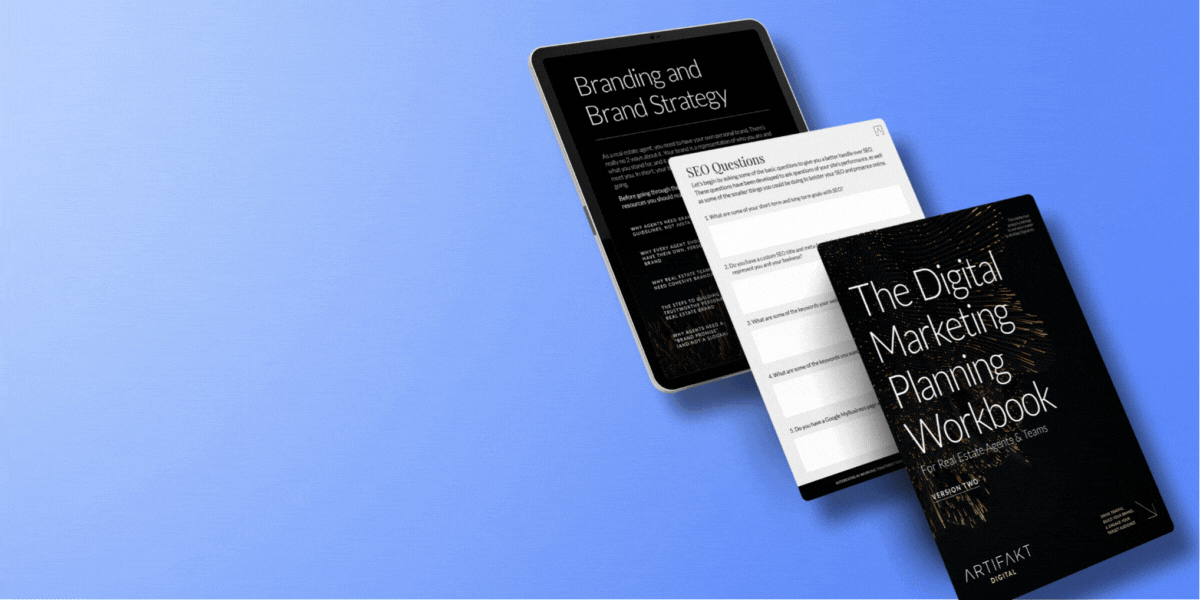Why Your Real Estate Website Doesn’t Get Any Leads (and How to Start Fixing it)

Websites, on their own, are not magic. At their worst, they are templated, unplanned, digital business cards with a few random CTAs. At their best, they can be well-thought-out, strategized data hubs, with strong CTAs, and built with an ideal target audience in mind.
If your website is strategically planned and professionally built, that’s half the battle to implementing a solid lead-generation strategy. If you have a professional website, then you need to think about your marketing plan immediately once it launches.
A website without a strategy isn’t magic. One with a solid, well-planned marketing strategy that’s generating the results you want can sure feel like it, though.
Simply put, the main way to get leads on your website is through a detailed, comprehensive marketing strategy. The kind that drives the correct, high-quality traffic that is most likely to convert to a website that knows just how to convert them.
Once you drive traffic to your website, it’s the website’s job to convert it. But if your website isn’t getting traffic (especially quality traffic) and you don’t have a strategy in place, you have little chance of getting leads and conversions from the beginning.
Don’t necessarily do what your colleagues or competitors do
Agents often say: I need help with email marketing, or I need help with drip campaigns, or I need help with a paid search strategy. Yet, they rarely answer the question as to why they actually need it.
They might know another agent that’s really crushing it with some form of marketing, so they think an easy solution is to implement something similar.
Unfortunately, it’s a very reactive approach to take. What they truly need is a comprehensive marketing strategy that covers all of the bases, and maybe includes what their original ask was (if it makes sense).
If you’re not using a comprehensive marketing plan, and your business isn’t truly embracing digital, then simply setting up an email marketing campaign isn’t really going to do much. You need to start from the ground up…
So, how do you decide what to include as part of your marketing strategy? Should you include email marketing? A text message nurturing campaign? What’s going to work for you?
Maybe it’s the latest lead generation software that you saw at the conference you just attended? Maybe, but not before you look at what you’re already doing and begin to plan something bigger and more comprehensive.
Is your website built to convert?
Your website should be the primary hub for your marketing. That’s because it’s the first place your marketing and lead-generation efforts should be pushing people to convert.
Just because you have a website doesn’t mean it will convert. Getting conversions is difficult, and in a lot of ways, it’s a science and an art.
From having an authentic voice, to how your menu functions, to what the text is on your buttons to where your forms are located; every single detail matters when it comes to conversions.
Conversions should be planned in 2 ways:
- They should be in line with what you want visitors to do
- They should match what visitors will actually do
Just because you want someone to do something, it doesn’t mean they’ll follow through with it.
Start by looking at your overall analytics and ask yourself:
- Which pages get the most traffic?
- Are those pages set up to convert on?
- Are there too many CTAs on those pages?
- What’s confusing the user on those pages?
Remember, it’s not just what you want your users to do. It’s about asking “will they want to do this?” and then delivering a solution that fits. The job of your website is to convert the right people, and that starts by guiding them down the right path and towards a call to action.
The overall goal of your marketing plan should be to push people to your site. From there, you need to ensure that your site is set up to succeed.
★ Want to get started auditing your website, but not sure where to begin? Start by downloading our Digital Business Plan Workbook. It’s self-guided, interactive, and free. Click right here to get it.
Fixing your broken lead generation strategy
To generate leads, your marketing strategy needs to be holistic.
You need to cover all of your bases and ensure you’re not putting all of your marketing strategy technique eggs into one basket. For example, in 2019, we saw a lot of success generating leads for real estate agents with paid search, and while that will certainly continue into 2020, it doesn’t mean you should abandon your organic SEO strategy.
When you’re putting together your marketing strategy, you need to start with a target audience and remember that you’re planning a strategy to attract them. What are their needs? What are their problems? How are you solving those problems right now? Your overall messaging should be crafted around that.
A holistic marketing strategy should include a few basics: branding consistency, content strategy (blogging, on-going content additions), organic SEO strategy, advertising strategy, and even print marketing strategy.
Including all of these methods ensures that you have multiple ways to drive people to your website to convert. As part of understanding each of these pieces so you can begin building your strategy, check out these resources:
- Why Real Estate Teams Need Cohesive Branding
- Why Agents Should be Investing in Their Real Estate Blog Strategy
- Building a Well-Rounded SEO Search Strategy for Your Real Estate Website
- Using Paid Search for Real Estate Agents Get More Conversions and Transactions
Your marketing plan is always evolving
Once you have your plan together, and you being executing on it, don’t think it can’t change.
Not only can it, it should. You should be looking at what’s working and what isn’t and adjusting your strategy accordingly. After all, adjusting is a key part of marketing.
Your marketing strategy should be looked at as a living, breathing plan that pivots and changes as you, your clients, and your real estate market changes.
In the end, if you want more leads, your website needs to be professionally planned and built. That said, you also need a holistic marketing strategy that pushes people to your website to learn about you, interact with your brand, and get a feeling of what you stand for (and how you help).
And, ultimately, gets them to convert with confidence.
Want to plan your digital strategy on your own, and set your business up for success? Download our workbook: ‘The Digital Business Planning Workbook’. It’s a self-guided, interactive, strategic workbook where you answer questions about branding, SEO, content, design, and a lot more, so you can set goals for your website and your digital marketing efforts. And, it’s free to download.






















